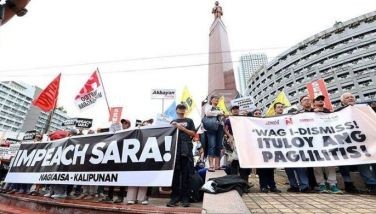Law can ban abusive men from homes
August 14, 2006 | 12:00am
Two years after Republic Act 9262 was enacted into law, many husbands still do not realize they can be banned from their own homes if they maltreat their wives or children.
What's worse is that even the barangay officials -particularly those in the remote barangays of the city and municipalities- are not aware of the provisions of the law that was enacted on March 8, 2004.
Republic Act 9262 empowers the barangay officials to prevent an abusive husband from going into his conjugal house for at least 15 days by issuing a Barangay Protection Order after the victim complains to the barangay hall.
A protection order is an order issued under this act for the purpose of preventing further acts of violence against a woman or her child for the purpose of safeguarding the victim from further harm, minimizing any disruption in the victim's daily life, and facilitating the opportunity and ability of the victim to independently regain control over her life.
When the concerned person ignores the BPO issued by either the barangay captain or any of the councilmen, they can be arrested, but some of the barangay officials in Cebu's northern town of Bogo and San Remigio said "Wala mi kaayo kahibalo anang balaura dinhi."
The records of the Lupong Tagapamayapa in different barangays of Cebu City showed that domestic quarrels are very rampant particularly in thickly-populated areas.
The officials of the Department of Interior and Local Government have already conducted seminars that discussed the provisions of the Anti-Violence Against Women and Children's act, but some barangay officials failed to attend.
"Violence against women and their children" refers to any act or a series of acts committed by any person against a woman who is his wife, former wife, or against a woman with whom the person has or had a sexual or dating relationship, or with whom he has a common child, or against her child whether legitimate or illegitimate, which result in or is likely to result in physical, sexual, psychological harm or suffering, or economic abuse including threats.
Even if the husbands will force her wife or children to read or watch obscene publications and indecent shows or forcing the woman or her child to do indecent acts, forcing the wife or his lover to live in the conjugal home or sleep together in the same room with the abuser is already an offense.
Of the cases that reached the Lupong Tagapamayapa, the barangay justice system, the failure of the husbands to remit their salaries during payday is among the common reasons that ignite misunderstanding between a couple.
Under the new law, non-remittance of salaries by a husband to their spouses is considered economic abuse that may also be interpreted as a withdrawal of financial support to his family.
If the wife wants to engage in a legitimate profession, occupation or business, she cannot be prevented; otherwise the husband would violate the law.
Once the acts are committed while the woman or child is pregnant or committed in the presence of her child, the penalty to be applied shall be the maximum period of penalty prescribed in the section.
Aside from the penalty of imprisonment of not more than six years if he is convicted, the concerned husband may be also slapped with a fine from P100,000 but not more than P300,000 and for him to undergo mandatory psychological counseling or psychiatric treatment. - Rene U. Borromeo
What's worse is that even the barangay officials -particularly those in the remote barangays of the city and municipalities- are not aware of the provisions of the law that was enacted on March 8, 2004.
Republic Act 9262 empowers the barangay officials to prevent an abusive husband from going into his conjugal house for at least 15 days by issuing a Barangay Protection Order after the victim complains to the barangay hall.
A protection order is an order issued under this act for the purpose of preventing further acts of violence against a woman or her child for the purpose of safeguarding the victim from further harm, minimizing any disruption in the victim's daily life, and facilitating the opportunity and ability of the victim to independently regain control over her life.
When the concerned person ignores the BPO issued by either the barangay captain or any of the councilmen, they can be arrested, but some of the barangay officials in Cebu's northern town of Bogo and San Remigio said "Wala mi kaayo kahibalo anang balaura dinhi."
The records of the Lupong Tagapamayapa in different barangays of Cebu City showed that domestic quarrels are very rampant particularly in thickly-populated areas.
The officials of the Department of Interior and Local Government have already conducted seminars that discussed the provisions of the Anti-Violence Against Women and Children's act, but some barangay officials failed to attend.
"Violence against women and their children" refers to any act or a series of acts committed by any person against a woman who is his wife, former wife, or against a woman with whom the person has or had a sexual or dating relationship, or with whom he has a common child, or against her child whether legitimate or illegitimate, which result in or is likely to result in physical, sexual, psychological harm or suffering, or economic abuse including threats.
Even if the husbands will force her wife or children to read or watch obscene publications and indecent shows or forcing the woman or her child to do indecent acts, forcing the wife or his lover to live in the conjugal home or sleep together in the same room with the abuser is already an offense.
Of the cases that reached the Lupong Tagapamayapa, the barangay justice system, the failure of the husbands to remit their salaries during payday is among the common reasons that ignite misunderstanding between a couple.
Under the new law, non-remittance of salaries by a husband to their spouses is considered economic abuse that may also be interpreted as a withdrawal of financial support to his family.
If the wife wants to engage in a legitimate profession, occupation or business, she cannot be prevented; otherwise the husband would violate the law.
Once the acts are committed while the woman or child is pregnant or committed in the presence of her child, the penalty to be applied shall be the maximum period of penalty prescribed in the section.
Aside from the penalty of imprisonment of not more than six years if he is convicted, the concerned husband may be also slapped with a fine from P100,000 but not more than P300,000 and for him to undergo mandatory psychological counseling or psychiatric treatment. - Rene U. Borromeo
BrandSpace Articles
<
>
- Latest
- Trending
Trending
Latest
Trending
Latest
Recommended





















